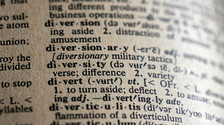Hawash
what is the difference between " should " and " supposed " ?!
what should i do
what am i supposed to do
is there a difference in the meaning ?!
Jan 31, 2016 4:36 PM
Answers · 4
2
In practice, you can use these interchangeably. But there is a very subtle difference between 1: "What am I supposed to do?" and 2: "What should I do?". Sentence 1 implies more a set of external rules that are 'supposed' to be followed. Sentence 2 is not quite as narrow and could refer to somebody making a freer choice, or being guided by their own conscience.
For example. Imagine you must decide whether to buy an apple or an orange. If you say: "I should buy the apple", this implies that the apple is the best choice for reasons that you have thought about yourself; maybe you prefer the taste and the orange is slightly rotten.
If, on the other hand, you say: "I am supposed to buy the apple", this more strongly implies that some predetermined destiny is guiding you to buy the apple.
Another example: If you were baking a cake with a friend and wanted to ask them about the next step in the recipe, if you say: "What am I supposed to do next?" It is clear that you are asking about the next step in the recipe.
However, if you ask "What should I do next?" there is a chance that you are not only talking about the recipe and may be asking your friend what they think you should do next in a more general, abstract sense.
In everyday speaking, should is usually a safer bet, but both are fine and understandable in any situation.
Hope that isn't too confusing, like I said the distinction is very subtle and most people wouldn't even notice you use them interchangeably :)
January 31, 2016
1
I'll start by tidying up your question. It should read:
What is the difference between " should " and " supposed " ?
"What should I do?"
"What am I supposed to do?"
Is there a difference in the meaning ?
A lot of people, young native speakers included, seem to think that capitalisation and punctuation are optional extras - pointless embellishments that serve no useful purpose other than to slow down your typing. Nothing could be further from the truth. Capital letters and punctuation are essential features of the written language. Not only do they carry meaning, but they also make your writing clearer and pleasanter to read. Seeing you have taken so much trouble to learn a foreign language with a script different from your own, it seems a terrible waste to ruin it by not bothering to punctuate or capitalise. 'Spoiling the ship for a ha'porth of tar', if you know the idiom.
And to answer your question, 'What should I do?' means 'What do believe is the best thing for me to do?', whereas 'What am I supposed to do?' means 'What am I expected to do?' or 'What are my options in this situation?'. In some cases, the meaning may be the same, but not in all cases.
And to return to the issue above to give you another example, note that I wrote 'should'. Your question 'should' have been written using capital letters and correct punctuation marks. That is how it 'should' be. If you say this is how it is 'supposed to' be, we would understand that you had written it correctly, but for some technical reason the letters didn't come out as you intended. That is another difference between 'should' and 'supposed to'.
I hope that helps.
January 31, 2016
1
These both have the same meaning
January 31, 2016
Still haven’t found your answers?
Write down your questions and let the native speakers help you!
Hawash
Language Skills
Arabic, English, German
Learning Language
German
Articles You May Also Like

Top 6 Mistakes to Avoid with Vocabulary Acquisition
38 likes · 9 Comments

Navigating Your First Job: Do's and Don'ts in the Workplace
46 likes · 19 Comments

What Content to Watch to Acquire Advanced-level Proficiency
79 likes · 49 Comments
More articles
